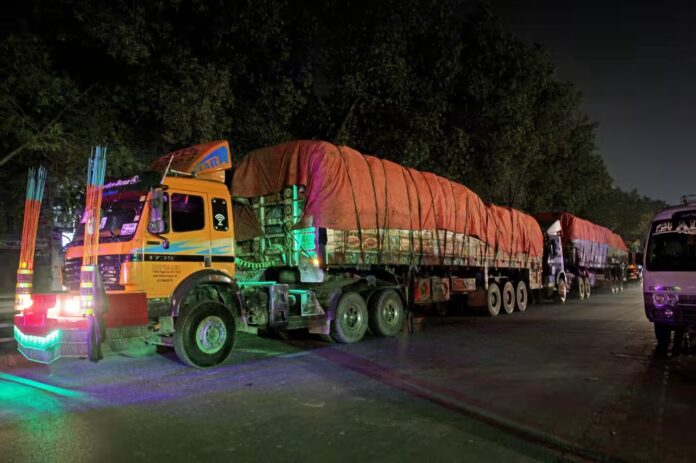BERLIN: India is strengthening its soft power in Afghanistan as a provider of crucial aid, going through Iran and sidelining a once indispensable Pakistan.
An Indian donation of 20,000 metric tonnes of wheat is expected to arrive in Afghanistan in the next couple of months, a representative of the United Nations World Food Programme recently told Nikkei Asia. This would make good on an announcement in March, when New Delhi committed to sending the wheat through Iran’s Chabahar port. Ultimately, the supplies are to cross the Iranian border into Afghanistan’s Herat province.
Hunger in Afghanistan remains widespread, with the WFP estimating that more than 19 million people suffer from acute food insecurity, when a lack of adequate food puts lives or livelihoods in immediate danger. A recent Taliban-imposed ban on female U.N. staff in Afghanistan caused an uproar in the international community and raised additional fears for the country’s future, even prompting hints at a U.N. pullout. But the WFP representative clarified the organization is committed to delivering aid where hunger threatens the lives of millions.
“The humanitarian needs across the country remain very high,” the representative said, “and [India’s] contribution will help us reach hungry families where needs are highest.”
The move not only reinforces India’s position as a key provider of essential aid to Afghanistan but also highlights New Delhi’s efforts to craft positive relations, even though it does not formally recognize the Taliban regime that seized power in August 2021. India reestablished its diplomatic presence in mid-2022 by deploying a “technical team” in the Afghan capital. Experts say the region is simply too important to leave.
In addition, the latest food aid marks a geopolitically significant change in the way India supplies assistance.
In response to the crisis in Afghanistan, India initially suggested trucking 50,000 tonnes of wheat through archrival Pakistan. Following extensive deliberations and prodding from the Afghan Taliban, Pakistan granted approval in November 2021. Consequently, the first shipment of Indian wheat was transported via the Pakistani transit route in February 2022.
However, despite India’s request, Pakistan did not grant an extension to the stipulated period, limiting the shipments to 40,000 tonnes.
Using the port at Chabahar offers substantial advantages over sending wheat through Pakistan, skirting the tense relationship between the nuclear-armed neighbors and allowing India to help Afghans more effectively.
“Use of Chahbahar negates the indispensability of Pakistan in terms of India reaching out to Afghanistan and Central Asia, especially since [Islamabad’s] own relations have gone south with the Taliban and ours have gotten better,” said Ashok Sajjanhar, a former Indian ambassador to Kazakhstan, Sweden and Latvia.
“India has always had a historical and civilizational connect with the people [of Afghanistan],” he added. He also stressed the importance of having Indian officials in Afghanistan: “We want to have a technical presence and not a diplomatic one on Afghan soil,” he said. “We want to ensure that the aid we are going to supply reaches the rightful beneficiaries and not used by the authorities to serve its own people.”
Asked if India’s use of Chahbahar should worry Pakistan, Sajjanhar said it might be “a matter of concern.”
Islamabad’s own relations with the Afghan Taliban have soured, in part over the Kabul rulers’ inability or unwillingness to rein in Pakistani Taliban militants. And now India is tightening ties in a country Islamabad has long considered part of its sphere of influence.
A Pakistani expert, however, downplayed the shift, stressing that India and Afghanistan are sovereign states and their relationship should not be viewed through the prism of Pakistan.
“I think India and Afghanistan are free countries and must pursue autonomous, independent relations with each other,” said Mosharraf Zaidi, senior fellow at the TABADLab think tank and a former policy adviser to Pakistan’s Ministry of Foreign Affairs. “In fact, the more regionally integrated countries are amongst each other, the better it is for Pakistan.”
Afghanistan’s internationally isolated officials have naturally welcomed India’s outreach.
“India is an important country in the region, and Afghanistan values it,” Taliban spokesman Zabiullah Mujahid told Nikkei Asia. “We want to have good, friendly, and strong people-to-people relationships with India. The fact that India has just announced a donation of 20,000 metric tonnes of wheat is a great help to the people of Afghanistan, and we are very thankful to the people and government of India for this support.”
There are other signs of deepening ties, though New Delhi is keeping expectations in check. In mid-March, after India promised the wheat, the Taliban’s Ministry of Foreign Affairs released a memo about a four-day training program for ministry officials through the Indian Embassy. Soon afterward, India clarified in its own local media that the Indian Technical and Economic Cooperation (ITEC) program under the Indian External Affairs Ministry is fully online and does not reflect a change in New Delhi’s policy toward Kabul.
Nevertheless, Mujahid acknowledged the training and thanked the embassy for its engagement.
Zaidi, the Pakistani expert, suggested that ties between Pakistan’s neighbors are inevitable and that the key is to solve the nuclear powers’ own rivalry.
“It’s understandable that eventually the Taliban and India would get along, and Iran and India would get along,” Zaidi said. “I think the question for me is how Pakistan can develop a framework for a normal relationship with India in which key issues are resolved to a point where countries don’t feel threatened by each other.”

































